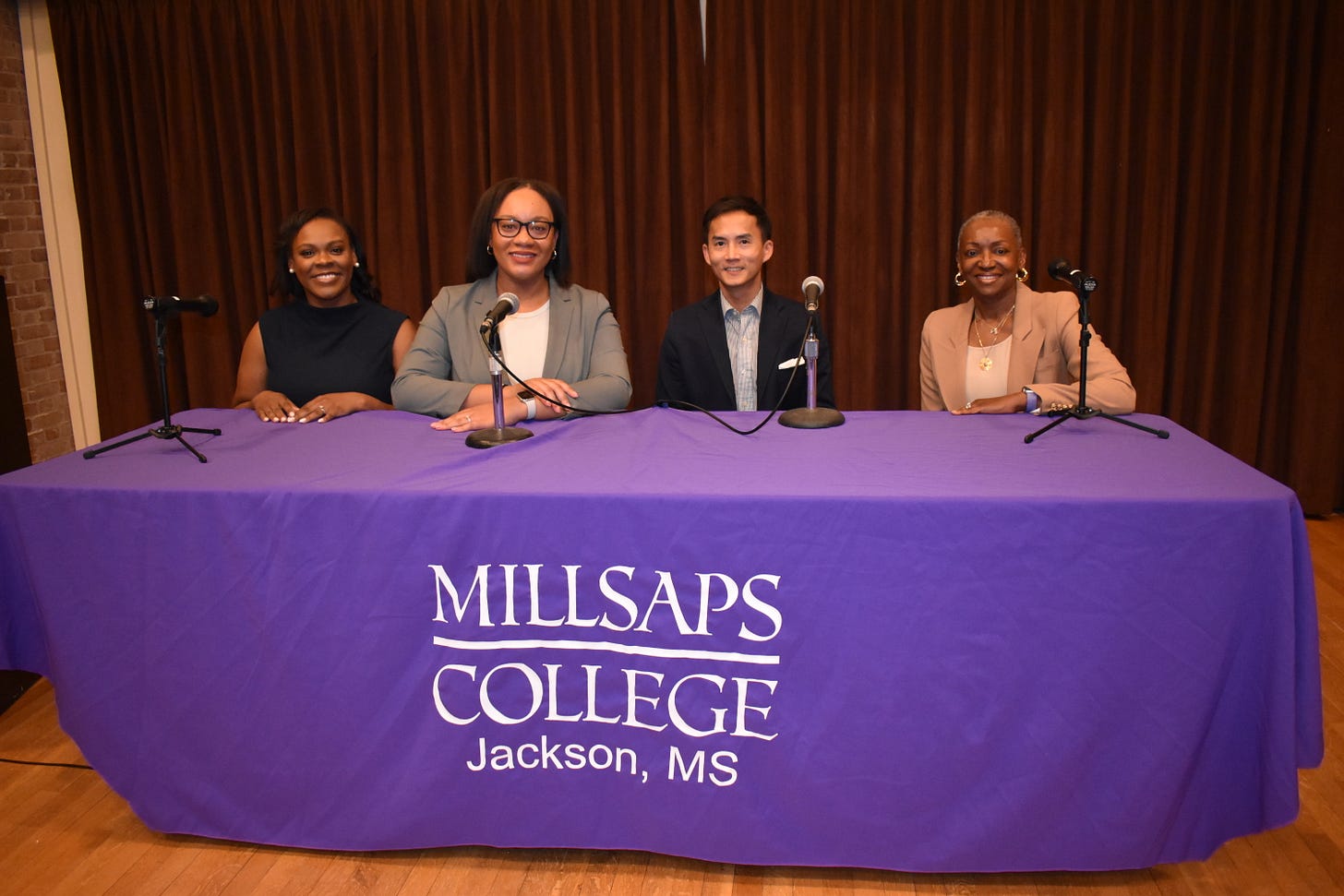Voting rights panel: Lower income Mississippians face barriers to voting in pivotal 2024 elections
The greatest issue facing the Mississippi electorate when it comes to participating in the Nov. 5, 2024, elections is “the cost of voting,” observed Joshua Tom, legal director of the ACLU of Mississippi, at a Millsaps College panel discussion on Oct. 3, 2024.
Tom argued that the expense of registering to vote and casting a ballot is higher in Mississippi due to lack of access to early voting or online registration options, which requires residents to physically travel to registrars’ offices and voting precincts. That lack of access can also force voters to travel and/or take off from work to register and vote.
The panel discussion, titled “Choosing Our Future: A Community Conversation on Voting Rights,” was moderated by Arekia Bennett-Scott, executive director of Mississippi Votes, and included Valencia Richardson, voting rights legal counsel for the Campaign Legal Center, and Vangela Wade, president and CEO of the Mississippi Center for Justice. About 50 students, faculty, staff at the Jackson college and community members attended the discussion.
All three panelists asserted that Mississippi makes it harder for lower income residents to vote. Wade said economic inequality comes into play due to the challenges of transportation to polls across the state’s rural, sparsely populated landscape.
Richardson, who advocates and litigates for lower income voters and authored an article titled “Voting While Poor: Reviving the Twenty-Fourth Amendment and Eliminating the Modern-Day Poll Tax,” noted that Mississippi is one of only two states in the U.S. that do not allow online voter registration (the other is Texas).
Mississippi, Tennessee and Virginia also do not have a set legal code for restoring voting rights to felons, Richardson noted. In effect, she said, disenfranchised felons have only one option for seeking restoration of rights: “If you want your right to vote restored, you will have to personally plead your case to the state legislature to get your right to vote back.”
Felony enfranchisement and lack of access to information about voter registration regulations were two through-lines of the panel discussion. All three panelists criticized the website of Mississippi Secretary of State Tom Watson’s office for not providing more resources about voting. Sos.ms.gov lists 23 felonies for which a voter’s rights may be revoked but does not elaborate on voting rights and opportunities, the panelists argued. The site also does not thoroughly document or publicize polling place closures or consolidations in rural areas, according to the panelists, which they said creates another obstacle for voters with limited access to transportation.
Bennett-Scott asked the panel to envision what role a liberal arts college such as Millsaps should play in an effort to educate voters and get out the vote. The consensus was that students, faculty and staff should be proactive in voting, encourage others to do so and publicize the state’s shortcomings when it comes to voting access.
Speaking directly to the students, Wade said, “You are up next. It’s your turn. If you don't speak up and out, who will? You can’t keep leaning on and looking back to Dr. Martin Luther King, Jr., Fannie Lou Hamer and Thurgood Marshall. They are gone. They are not coming back. It’s you! You must speak out about issues and concerns with your friends, family, countrymen and on Twitter/X (and other platforms). That's where you have to make a difference. You can't sit quietly. The time is now to speak out, not only for now but for tomorrow — for the next generation. This is our time because we are here now. Let’s take advantage of our power!”
Asked how to instill and maintain hope in the election process and to overcome voter apathy, Richardson responded that the goal is to empower all members of a multiracial democracy. “We have to fight for [that],” she said, “because the alternative is unthinkable.”
Adam Atigh is a senior at Millsaps College majoring in politics and in history and government.
Image: (L-R) Arekia Bennett-Scott, Valencia Richardson, Joshua Tom and Vangela Wade, courtesy Mississippi Center for Justice




